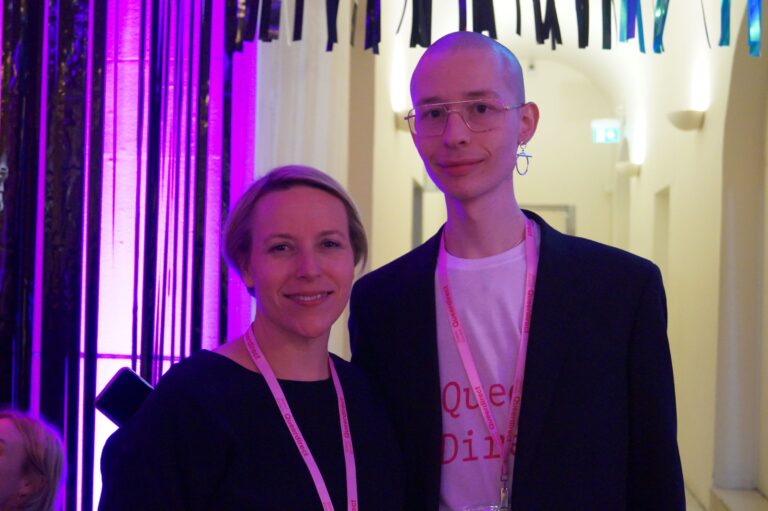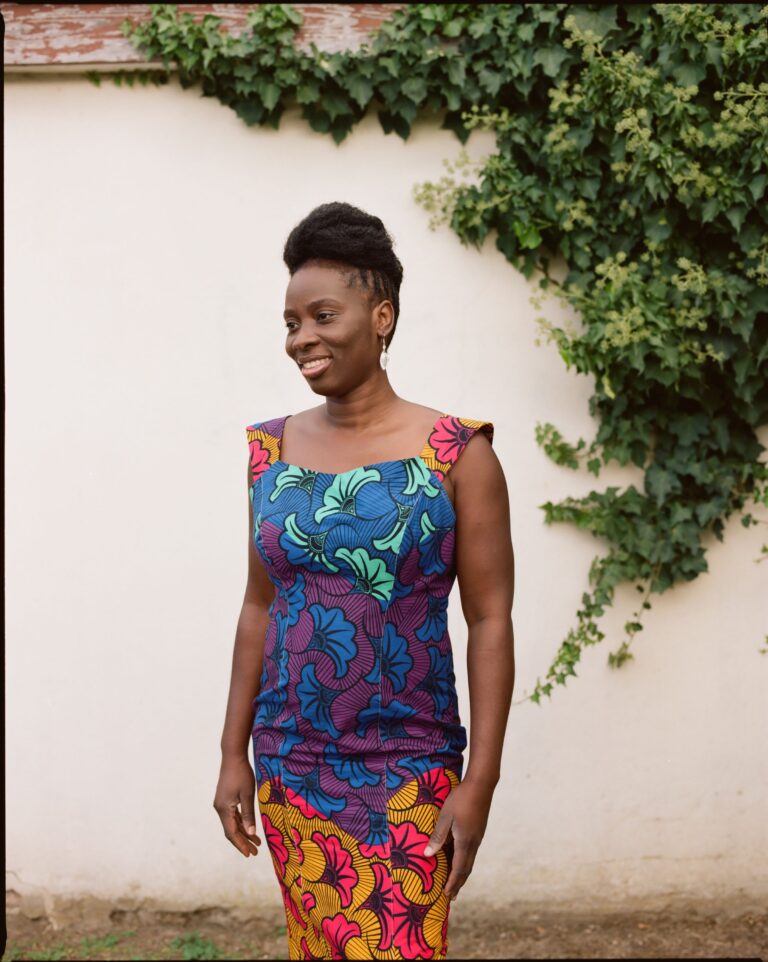Jade’s Story
By Robbie Wojciechowski
Jade Lewis is a theatre-practitioner, organiser, director, mentor, and a new mum. In fact, when we meet up to chat in Somerset House, she brings her little one along, carrying him in a papoose while he naps lying on her chest. She’s a member of Step Up and in a way, seeing her and hearing her talk about her work, it’s difficult to work out why she’s interested in a programme that is driven by mentoring and support.
As a theatre practitioner, she has toured shows, taken programmes to other countries with the British Council, engaged in collaborative writing, worked with peers, and set about creating a platform of theatre that is supportive and understanding at all levels.
“I’m interested in creating new works, new experiences, about making theatre accessible, it’s about using the platforms there are to start conversations, to start dialogues, to make an impact, and for people to see things in a different way and in a different light,” says Jade.
Within five minutes I’m dumbfounded by how inspiring her whole ethos is. She talks as if is she meditating. Thinking clearly and thoroughly before answering any questions I ask her. She sounds knowledgeable, supportive, understanding, as well as pertinent and self-aware.
“Whatever opportunity you’re given you have got to utilise it. I wouldn’t be where I am without the opportunity to access those opportunities.” Jade is also careful not to rely on them too much. “I feel like I’ve been training for years, but at the same time now, being a mum, how do you propel yourself to stand up, and make something, make your own platform without those access points.”
Much of what she says, feel like life lessons. Just like good codes of conduct to stick to, meditations and thoughts on creativity that are illuminating and inspiring. But as the conversation unwinds, she reveals a little about why she’s chosen to be part of the Step Up scheme.
“At one point you’re in the emerging bracket, but how long are you emerging for. And the thing is to get that next opportunity, you’ve had to direct a three-week run, and the big question is how do you do that.”
Becoming a mum left her full of lots of thoughts about where it would leave her career. Having just spent the last ten years training, Jade began thinking about the role a child would have in her development.
“When I was pregnant, I knew the child was going to come, but I was worried about my career. There are these societal pressures, it becomes a thing of questioning how you’re going to direct with a child, worrying whether you’ll be discriminated against. I was always asking myself whether I should tell them whether I’ve had a child. I realised regardless, life is going to change.”
Keeping a positive outlook has been an important part of her disposition as a mother working in the creative industries, informing her choices about the work she becomes involved in. “I try to have a positive outlook, I always ask what a rejection letter tells me – whether it’s telling me to do my own thing, to spend enough time with my boy as I can,” says Jade.
It turned out that having a child has played an important part in developing her creative work. “I have this idea of doing a show with your child, about motherhood. And thinking about how I can help other mothers, arts and culture, community, and people.”
In a way, Jade’s story shows how having the commitment to something else, totally outside of her work has been the biggest challenge of her life. But in other ways, it’s been her grounding force. Her work is inspired by her child, her working practice developing through it. Having someone to look after, has allowed her to think about her artistic practice, and how those in theatre, struggling with similar situations, could get support.
Jade has this great ability to universalise experience. At a fundamental level, we are all human, we’re all prone to down periods and difficult moments. We all get ill. We all have commitments far beyond just our own lives. Understanding that, and being a pragmatic part of changing the dialogue around it in her industry, she offers a powerful vision of what a reflexive vision of the arts sector could look like. “It’s about being the change, you know?” she says.
“My most recent show, ‘Quarter Life Crisis’, you know it’s a tongue and cheek, humour thing. But people in our industry are going through this; people under 30 are going through this. But it’s a millennial experience, and it’s only us that could write that story because it’s our story to be told. It creates a dialogue, a certain demographic of ourselves, but we don’t see these things that we think about and that we question.”
While rehearsing the show, Jade set up a system, whereby time would be spent working between the hours she could get childcare. Between 12 – 5 the company would rehearse thoroughly. This limiting of time meant the company had to be efficient. But the pragmatism it offered made it all the more powerful.
I ask her about how having a child has changed her relationships at work. “Everything has to have a purpose – worth me not being with my child. I got to that question, and wondered whether I might be able to get a little help for whatever I want to do,” says Jade.
What’s amazing is Jade’s optimism about where things could go in the future.
“Every generation will have different experiences. I think because of our narrative we’re in quite a unique position – more than before – because this is what you do. You know those nuclear ideas of things don’t exist in quite the same way.”
It’s this important understanding, this reflexive understanding of work in practice, commitments, and being able to engage with as a freelance theatre director, writer, and generally, someone who is self-employed, that is fundamental for looking at how we could think and implement more support to those who don’t work under contract.
With someone like Jade, I’m optimistic about how people are developing their own methods. But more could be done at a structural level to help people like Jade.







